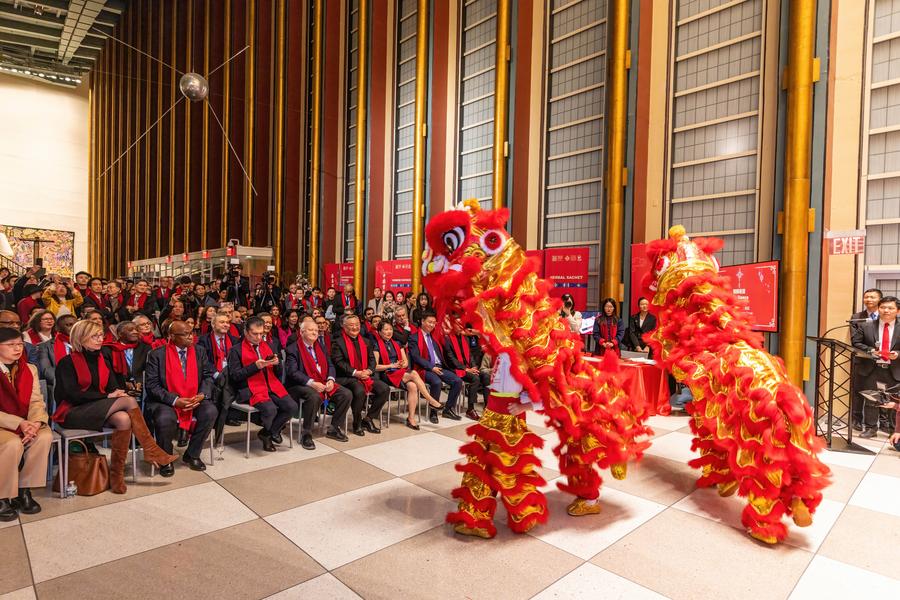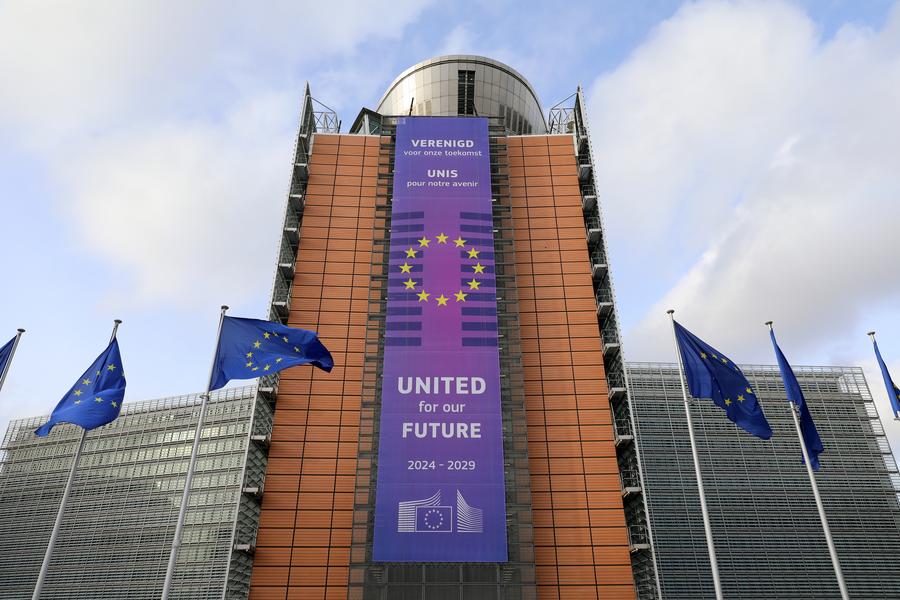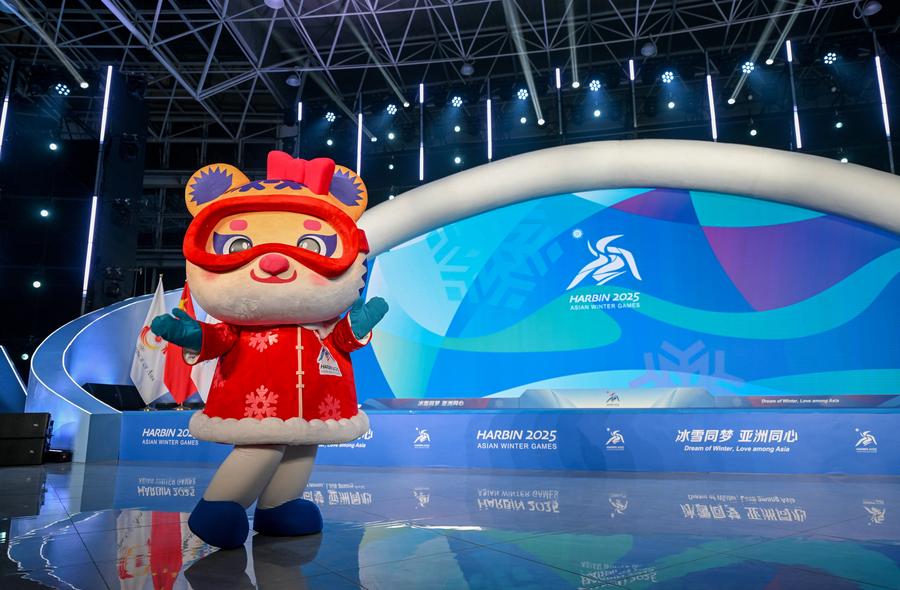
Actors perform the lion dance during the Chinese New Year celebration at the United Nations headquarters in New York, Jan 24, 2025. [Photo/Xinhua]
BEIJING -- Less than two months into the new year, China has been on a push to step up bilateral ties with the world's major countries and its partners in Europe, Asia and beyond.
Through a series of phone talks, exchanges of messages and face-to-face gatherings over the past weeks, President Xi Jinping and leaders of those countries have shared ideas on how to promote common development and further foster their cooperation.
"WE NEED TO WORK TOGETHER"
On Jan 17, three days ahead of the inauguration ceremony of then US President-elect Donald Trump, Xi held a telephone conversation with Trump.
China and the United States share extensive common interests and broad space for cooperation, and the two countries can become partners and friends, contribute to each other's success, and enjoy common prosperity, which will benefit both countries and the whole world, Xi told Trump during their phone talks.
It is inevitable that China and the United States, two major countries with different national conditions, have some differences, and the key is to respect each other's core interests and major concerns, and find appropriate ways to solve issues, Xi noted.
The Chinese leader also paid close attention to fostering stronger people-to-people bonds between the two countries. Ahead of this Spring Festival, Xi sent a Chinese New Year card in return to friends in the US state of Iowa, expressing his hope that the two peoples will pay more visits to each other and have more exchanges.
"We need to work together," said Dan Stein, chairman of the Muscatine-China Initiatives Committee. "And the more we can work together ... we could make a stable world where everybody can have opportunity and success."
STRENGTHENING TIES WITH RUSSIA, EU
In late January, Xi held a video meeting with his Russian counterpart, Vladimir Putin. On the last day of the past year, the two presidents also exchanged New Year greeting messages — a gesture kept by the two leaders in recent years and a reflection of a mature and stable China-Russia relationship.
In their video meeting, Xi stressed the important role of China-Russia relations in the global landscape. He called for coping with uncertainties of the external environment with the stability and resilience of China-Russia relations, jointly promoting the development and revitalization of the two countries, and upholding international fairness and justice.
Oleg Timofeyev, an associate professor at the Peoples' Friendship University of Russia, said the interaction between the Chinese and Russian leaders at the beginning of the New Year demonstrates the two countries' willingness and determination to play a stabilizing role at both global and regional levels.
This year marks the 50th anniversary of the China-EU diplomatic relations, and coincides with a time when new leaders take office in EU institutions. In an increasingly volatile global landscape, China-EU relations have taken on greater strategic and global significance.

This photo taken on Jan 29, 2025 shows the Berlaymont Building, the European Commission headquarters, in Brussels, Belgium. [Photo/Xinhua]
Highlighting the anniversary as an important milestone building on past achievements and charting the future, Xi's phone conversation with European Council President Antonio Costa in January provided clear guidance for the development of China-EU relations in the next stage.
The history of China-EU relations demonstrates that as long as both sides uphold mutual respect, treat each other as equals, and engage in candid dialogue, they can advance cooperation and make significant achievements, Xi said during the phone talk.
The more severe and complex the international situation becomes, the more China and Europe should adhere to the original aspirations of their diplomatic ties, he said, calling on both sides to strengthen strategic communication, enhance mutual strategic trust, and uphold their partnership.
Earlier this month, European Commission President Ursula von der Leyen said at the EU Ambassadors Conference 2025 that there is room for the EU to engage constructively with China, "find solutions in our mutual interest," and reach agreements to expand trade and investment.
Volker Tschapke, honorary president of Germany's Prussian Society, said he believes that under the background of geopolitical turbulence and slowing global economic growth, Europe and China have a solid and broad basis for strengthening common interests.
"The active interaction and communication between leaders of China and the United States, Russia and Europe have demonstrated China's clear plans for major country relations, helped promote coordination and cooperation among major countries, and demonstrated China's sense of responsibility in an era of turmoil," he said.
SHARED PROSPERITY
In China's "Ice City" Harbin, the 9th Asian Winter Games brought together leaders from many of China's neighboring countries, including Brunei, Kyrgyzstan, Pakistan, Thailand and South Korea.

Mascot reacts at the awarding ceremony for men's snowboard halfpipe at the 9th Asian Winter Games in Yabuli, Northeast China's Heilongjiang province, Feb 13, 2025. [Photo/Xinhua]
At a banquet held last week by Xi and his wife, Peng Liyuan, ahead of the opening ceremony of the games, the Chinese leader called on Asia to uphold the common dream of peace and harmony, jointly respond to all sorts of security challenges, and contribute to building an equal and orderly multipolar world.
He also stressed the joint pursuit of prosperity and development, calling on Asian people to work together to promote progress and development, and provide sustained momentum for a universally beneficial and inclusive economic globalization.
Quoting the Chinese proverb "When people are of one mind and heart, they can move Mount Tai," Kyrgyz President Sadyr Japarov noted that Kyrgyzstan and China have achieved breakthroughs in many key cooperation projects in 2024 through fruitful and high-quality collaboration.
In January, large machinery such as excavators, cranes and bulldozers were sent from the Torugart Pass in China's Xinjiang Uygur autonomous region to the construction site of the China-Kyrgyzstan-Uzbekistan railway project. As a Belt and Road flagship project commenced at the end of 2024, this transport corridor holds a promising vision for regional development and prosperity.
Kyrgyzstan attaches great importance to the comprehensive strategic partnership for a new era with China, and the two countries have effectively enhanced mutual trust and benefits based on friendly relations and productive cooperation, Japarov told Xinhua in an exclusive written interview ahead of his four-day state visit to China earlier this month.
Since the start of the new year, China's high-quality cooperation with partner countries under the Belt and Road Initiative has been steadily advancing.
Before Pakistani President Asif Ali Zardari paid a state visit to China from Feb. 4 to 8, the New Gwadar International Airport, a China-aided project, officially commenced operations.
A day before Thai Prime Minister Paetongtarn Shinawatra's official visit to China from Feb 5 to 8, the Thai Cabinet approved the second phase of a high-speed rail project that connects Thailand with China via Laos.
Paetongtarn reaffirmed Thailand's commitment to advancing cooperation in infrastructure, trade and economy under the Belt and Road Initiative, and accelerating the construction of the Thailand-China railway, which is expected to further enhance exchanges between the two countries and peoples.
Speaking highly of China's rapid development and widely recognized initiatives, she emphasized that Thailand has always been open to China's proposals and initiatives.